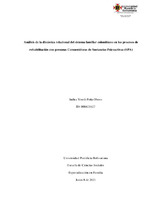| dc.contributor.advisor | Flórez Orduz, Luz Yamile | |
| dc.contributor.author | Peña Obeso, Indira Yiseth | |
| dc.coverage.spatial | Colombia | spa |
| dc.date.accessioned | 2024-01-19T17:18:27Z | |
| dc.date.available | 2024-01-19T17:18:27Z | |
| dc.date.issued | 2021 | |
| dc.identifier.other | Trabajo de Grado | |
| dc.identifier.uri | http://hdl.handle.net/20.500.11912/11364 | |
| dc.description | 36 páginas | spa |
| dc.description.abstract | El presente estudio es de carácter monográfico, se fundamenta en una revisión de la literatura científica sobre el
análisis de la dinámica relacional del sistema familiar colombiano en los procesos de rehabilitación con personas
Consumidoras de Sustancias Psicoactivas (SPA). En los resultados obtenidos se encontró que las dinámicas
familiares son cambiantes en pacientes consumidores, estas se modifican e influyen en sus tratamientos, siendo
factores de riesgo o de protección, debido que en su inicio son agentes motivantes, durante porque facilitan la
adherencia además del proceso de cambio positivo, y al final debido a que pueden contribuir en la recaída o el
abandono de este. También se resalta la manera como el ambiente familiar se reestructura de acuerdo con aspectos
relacionales, como la expresión de afectos, los roles de cada miembro y los canales de comunicación que manejan.
De acuerdo con lo mencionado, se hace necesario que en las intervenciones se haga participe al sistema familiar, para
que se analice su dinámica familiar, y esta influya de manera positiva en los resultados del tratamiento. | spa |
| dc.description.abstract | The present study is of a monographic nature, it is based on a review of the scientific literature on the analysis of the
relational dynamics of the Colombian family system in the rehabilitation processes with people who are Consumers
of Psychoactive Substances (SPA). In the results obtained, it was found that family dynamics are changing in
consumer patients, these are modified and influence their treatments, being risk or protective factors, because at the
beginning they are motivating agents, during because they facilitate adherence in addition to the process of positive
change, and in the end because they can contribute to the relapse or abandonment of this. The way in which the
family environment is restructured according to relational aspects is also highlighted, such as the expression of
affection, the roles of each member and the communication channels they handle. According to the aforementioned,
it is necessary for the family system to participate in the interventions, so that its family dynamics is analyzed, and
this positively influences the results of the treatment. | en |
| dc.format.mimetype | application/pdf | spa |
| dc.language.iso | spa | spa |
| dc.rights | Attribution-NonCommercial-NoDerivatives 4.0 Internacional | * |
| dc.rights.uri | http://creativecommons.org/licenses/by-nc-nd/4.0/ | * |
| dc.subject | Consumo de Sustancias Psicoactivas (SPA) | spa |
| dc.subject | Dinámica familiar | spa |
| dc.subject | Proceso de rehabilitación | spa |
| dc.title | Análisis de la dinámica relacional del sistema familiar colombiano en los procesos de rehabilitación con personas Consumidoras de Sustancias Psicoactivas (SPA) | spa |
| dc.type | Trabajo de grado | spa |
| dc.publisher.department | Escuela de Ciencias Sociales | spa |
| dc.publisher.program | Especialización en Familia | spa |
| dc.type.hasVersion | draft | spa |
| dc.description.sectional | Bucaramanga | spa |
| dc.relation.projectID | Dinámica relacional_sistema familiar colombiano_procesos de rehabilitación_personas Consumidoras de Sustancias Psicoactivas (SPA) | spa |
| dc.description.degreename | Especialista en Familia | spa |


